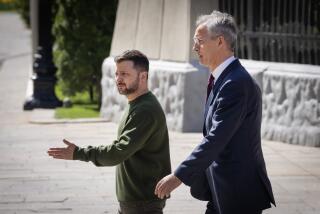U.S. Calls Up Reservists to Boost Air War
The Pentagon on Tuesday summoned 2,116 reservists, the first of 33,100 who eventually will be called up, to provide the fliers and ground crews for hundreds of additional aircraft as NATO’s aerial assault on Yugoslavia shaped up as a long war of attrition.
President Clinton signed the activation order for the Air Force Reserve and Air National Guard personnel.
On the diplomatic front, U.S. and Russian officials inched closer to a common approach that both sides hope will persuade Yugoslav President Slobodan Milosevic to accept NATO’s conditions for ending the alliance’s 5-week-old bombardment. The allies demand in part that Milosevic abandon his campaign of “ethnic cleansing” in Kosovo, a province of Serbia, the dominant Yugoslav republic.
Deputy Secretary of State Strobe Talbott met in Moscow with Russian peace envoy Viktor S. Chernomyrdin. Although wide gaps remain between the U.S. and Russian positions, a senior State Department official said the talks had moved them closer to a common ground that could produce a diplomatic solution in Kosovo.
But, like the air war, the diplomatic effort will require patience, U.S. officials said. They warned that there were no solutions imminent through either military or diplomatic means.
Pentagon spokesman Kenneth H. Bacon said the reservists, including members of an air refueling wing in Northern California, will allow NATO to wage “more robust, 24-hour-a-day operations and to hit a broader range of targets.”
All the reservists summoned Tuesday operate the tankers used in aerial refueling operations. In addition to the 250 reservists and as many as eight KC-135A Stratotanker aircraft from the 940th Air Refueling Wing at Beale Air Force Base in Marysville, north of Sacramento, reservists come from Alabama, Arizona, Indiana, Kansas, Michigan, Pennsylvania and Wisconsin.
The Air Force also is invoking authority to halt departure from the service of personnel who were planning to retire or resign but whose skills are now in demand because of the air war.
Under the call-up order, the Air Force can activate 25,000 people and the Army 6,500. The others will come from the Navy, Marine Corps and Coast Guard. It was the largest reserve call-up since President Bush activated 239,000 troops during the 1991 Persian Gulf War. The reservists may be required to serve 270 days on active duty if needed.
General Guarantees a NATO Victory
At the North Atlantic Treaty Organization headquarters in Brussels, U.S. Gen. Wesley K. Clark, commander of alliance forces, delivered a resolutely upbeat scorecard on the air campaign. He asserted that allied forces were demolishing the Yugoslav military “step by step, bit by bit.” Inclement weather and efforts to avoid civilian casualties have slowed the bombardments from reaching their desired effect, Clark acknowledged, but he said systematic damage inflicted on the Yugoslav war machine guarantees that “NATO can’t lose.”
In other developments Tuesday, the 35th day of the bombing campaign:
* The House International Relations Committee turned down an attempt by Rep. Tom Campbell (R-San Jose) to force Congress to invoke the 1973 War Powers Resolution by either declaring war or requiring Clinton to withdraw all U.S. forces within 30 days. The committee votes were 30 to 19 against withdrawal and 49 to 0 against a declaration of war. Under House rules, the resolutions must go to the floor for a vote despite the committee’s disapproval, but they are thought to have no chance of passage.
* The House Appropriations Committee agreed to act Thursday on Clinton’s request for emergency Kosovo funding. Congressional leaders expect to move the measure through the Senate and House by the end of May. The committee’s Republican leaders announced that they would try to increase Clinton’s $6-billion request to at least $12.9 billion. Of the nearly $7 billion in extra money, about $2 billion would finance a military pay raise and $3 billion would improve military readiness.
* NATO airstrikes apparently claimed more civilian casualties as missiles fell on a residential area of Surdulica, a town in southern Serbia, killing at least 11 people, a civil defense official there said by telephone. Serbian state television said the death toll could go as high as 20. A state television reporter in the town said as many as 11 missiles were fired on the town, which is about 175 miles southeast of Belgrade, the Yugoslav and Serbian capital, but two missiles apparently caused most of the damage. The missiles may have been intended for an army barracks about four miles outside town.
* Refugees arriving in Kukes, Albania, said Yugoslav soldiers had ordered all the men and older boys from their caravan somewhere between the Kosovo towns of Djakovica and Prizren and lined them up by the side of the road. As the refugees fled, they heard gunfire behind them but did not see whether their male relatives had fallen.
* The Pentagon said it was trying to verify unconfirmed reports that as many as 70 refugees were executed during the last five days in a town northeast of Pristina, the capital of Kosovo. An official said that if the reports could be substantiated, the information would be forwarded to the International War Crimes Tribunal for the Former Yugoslavia in The Hague.
* Three U.S. soldiers captured by Yugoslav forces nearly a month ago were “in satisfactory condition,” the International Committee of the Red Cross said after a doctor examined them. The Red Cross also delivered letters to the three and took letters from the captives to their families.
* The Rev. Jesse Jackson said his delegation will go ahead with plans to travel to Yugoslavia in hopes of securing the release of the captive U.S. soldiers, despite warnings from the Clinton administration that the trip was too dangerous.
* At the United Nations, a top U.N. official said a planned NATO oil embargo on Yugoslavia would hurt civilians and add to the already nearly impossible challenges facing relief workers in the Balkans. Sergio Vieira de Mello, undersecretary-general for humanitarian affairs, told the Security Council that U.N. agencies and others have concluded that an embargo would make the delivery of aid “even more complicated.”
Russian, U.S. Officials Take a ‘Step Forward’
In Moscow, Talbott and Chernomyrdin said their meeting had helped smooth over the worst dispute between the two countries since the end of the Cold War.
“As a result of our exchange of ideas, we understand each other very well,” Talbott said in Russian after the two-hour meeting. “We are working very openly, seriously and constructively with each other.”
Chernomyrdin said the meeting showed that the two countries “already have points of common ground. This is already a step forward.”
In Washington, State Department spokesman James P. Rubin said Talbott emphasized that the only way to end the bombing was for Milosevic to accept NATO’s conditions: an end to “ethnic cleansing,” withdrawal of Yugoslav forces from Kosovo, a return of refugees under the protection of an international peacekeeping force and eventual autonomy for residents of the restive province. He called those conditions “nonnegotiable.”
“Milosevic’s position on the international presence is quite clearly formulated: an international presence under the aegis of the United Nations . . . with the participation of Russia,” Chernomyrdin said. “Will this satisfy the other side? Not quite. But there are possibilities here for further discussion.”
However, in Belgrade, the Yugoslav government again rejected the presence of armed foreign soldiers on its territory.
“No armed forces, no armed troops on our ground,” Deputy Foreign Minister Nebojsa Vujovic, the government’s most prominent spokesman, said in an interview with The Times. “We are a sovereign country. No occupying force on our soil. No force which could allow secession of Kosovo.”
Vuk Draskovic, a onetime opposition leader who holds the post of deputy prime minister, said Monday he believed Milosevic was ready to accept armed observers.
“Mr. Draskovic is a writer, and he speaks in his well-known literary way,” Vujovic said dismissively. “Our position has not changed.”
Chernomyrdin stressed that because of Russia’s historical and religious relationship with Serbia, his country was uniquely situated to mediate.
“At first we were reasoning with one side,” he said, referring to his talks in Belgrade last week. “Now we are reasoning with the other side, talking about what compromises we can reach. This is the kind of conversation we had today.”
From the U.S. standpoint, the objective was somewhat different. “We hope that bringing us and the Russians closer to the same sheet of music will have an impact on Belgrade,” a senior State Department official said.
EU Action Against Belgrade Wins Praise
In Brussels, NATO spokesman Jamie Shea said the alliance is gradually isolating Yugoslavia. He said NATO leaders were pleased by the European Union’s decision over the weekend to tighten the financial noose around Yugoslavia by freezing financial assets and bank accounts of Milosevic and his top lieutenants, blocking export guarantees and banning investment and most trade.
Gen. Clark, meanwhile, contradicted the chairman of the alliance’s military committee, German Gen. Klaus Naumann, who said Monday that NATO had decided not to use force to prevent oil from reaching Yugoslavia by sea. Clark said final details of the blockade were still being worked on and that the use of force had not been ruled out.
Clark also claimed that Serbian men of draft age are ignoring mobilization orders and that morale has begun to decline among the forces digging into hillsides and shattered houses in Kosovo.
And in Tirana, the capital of Albania, a U.S. military spokesman said crews of the Army’s Apache helicopters deployed in the Balkan nation have been training aggressively in mountainous terrain for action over neighboring Kosovo. He sought to leave Yugoslav forces guessing about how soon they will strike.
Lt. Col. Garrie Dornan, spokesman for Task Force Hawk, dismissed the impact of Monday night’s crash of one of the $16-million Apaches, which left two crew members slightly injured.
“The effect of this is nil. We will drive on undeterred,” Dornan said.
The deployment of reservists from Beale Air Force Base represents more than a quarter of the 900 men and women attached to the 940th Wing--724 of them reservists, the rest active-duty or civilian personnel--and nearly half its aircraft. The volunteer personnel are scattered throughout the state, though the bulk live in Sacramento and other Central Valley communities around the rural air base.
“It is a significant deployment,” said Master Sgt. Patrick Clarke, an air wing spokesman at the base. “The attitude here is they’re ready to go, they’re ready when called.”
Clarke said no final decisions had been made on who would be going or when exactly they would depart.
The deployment is not unusual for the air wing at Beale: The 940th was involved in Operation Desert Storm and has rotated aircraft to assist NATO in subsequent missions against Iraq.
*
Kempster reported from Washington, Reynolds from Moscow and Williams from Brussels. Times staff writers Marc Lacey in Kukes, Richard Boudreaux in Belgrade, John Daniszewski in Tirana, Janet Wilson at the United Nations, Eric Bailey at Beale Air Force Base, and Paul Richter, Janet Hook and Art Pine in Washington contributed to this report.
(BEGIN TEXT OF INFOBOX / INFOGRAPHIC)
Called to Duty
These Air Force Reserve and Air National Guard units have been called up for active duty in the Kosovo operation, the first wave of as many as 33,100 reservists to be summoned for a maximum of six months:
AIR FORCE RESERVE
434th Air Refueling Wing
Location: Kokomo, Ind.
Personnel: 498
Aircraft: 7
927th Air Refueling Wing
Location: Detroit
Personnel: 58
Aircraft: --
931st Air Refueling Group
Location: Wichita, Kan.
Personnel: 64
Aircraft: --
940th Air Refueling Wing
Location: Marysville, Ala.
Personnel: 250
Aircraft: --
AIR NATIONAL GUARD
117th Air Refueling Wing
Location: Birmingham, Ala.
Personnel: 210
Aircraft: 6
128th Air Refueling Wing
Location: Milwaukee
Personnel: 281
Aircraft: 6
161st Air Refueling Wing
Location: Phoenix
Personnel: 284
Aircraft: 6
171st Air Refueling Wing
Location: Pittsburg
Personnel: 470
Aircraft: 14
More on the Crisis * UGLY SCENES--In the lawless north of Albania, bandits steal refugees’ last possessions.A14
* DISSENT STIFLED--Reformers in Yugoslavia say fear blocks any kind of mass protests.A14
More to Read
Start your day right
Sign up for Essential California for news, features and recommendations from the L.A. Times and beyond in your inbox six days a week.
You may occasionally receive promotional content from the Los Angeles Times.







